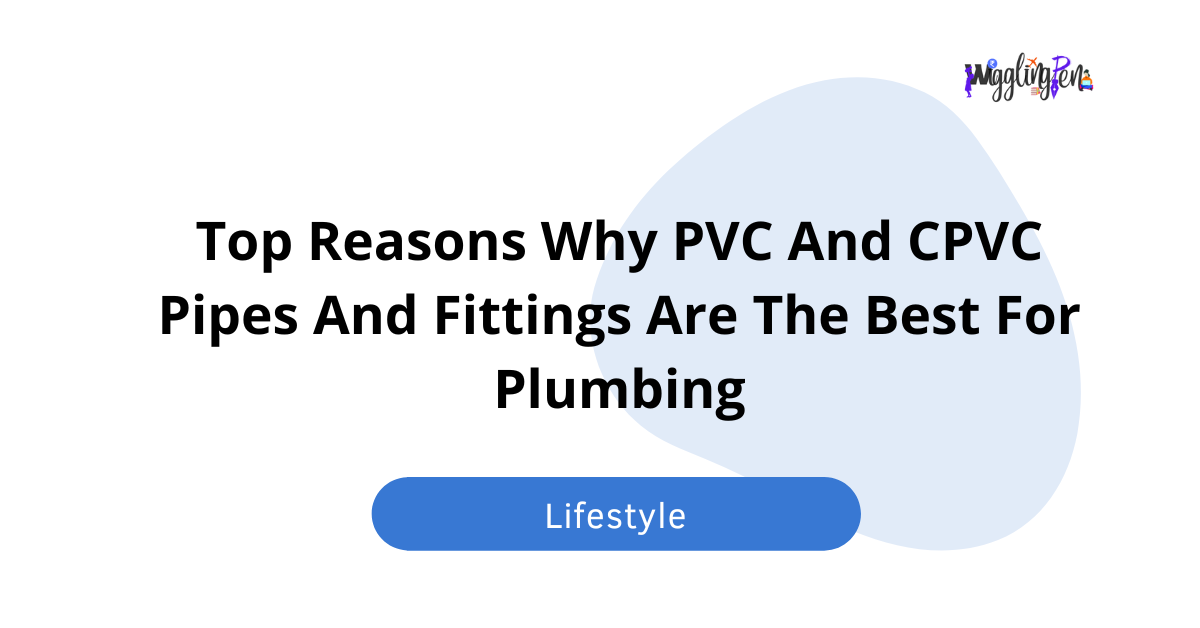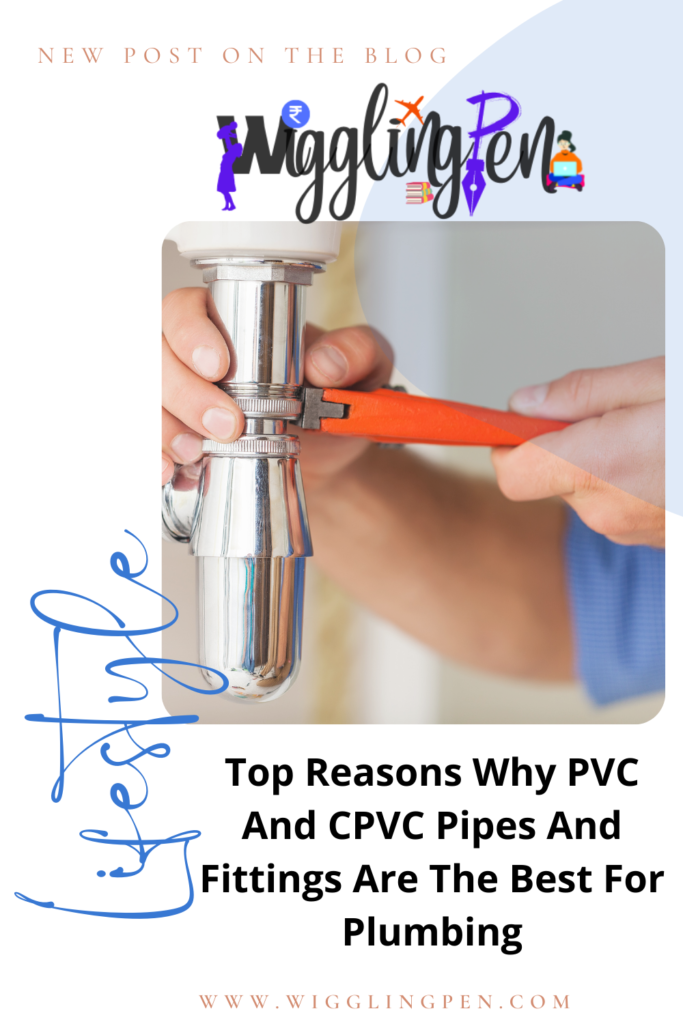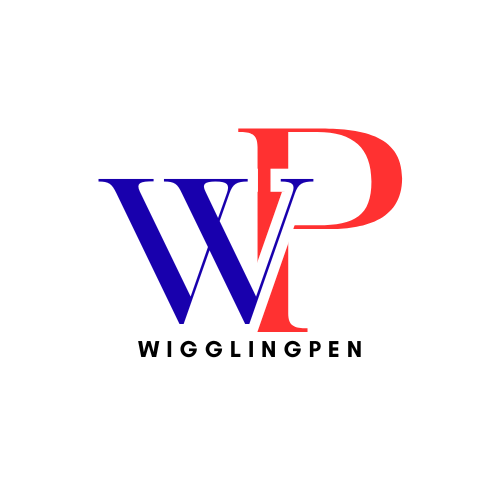
PVC And CPVC Pipes need to be considered the best when it comes to plumbing work at home or office. If you are going to invest in a home, plumbing work needs to be done with the most care. It’s always good to invest in good pipes and the PVC and CPVC pipes are the best for plumbing from drinking water transportation to advanced drainage solutions.
It holds great properties like environmental performance, recyclability, cost-effectiveness, and above all safety.
WHAT Are PVC AND CPVC Pipes?
Both PVC and CPVC pipes have advantages of relative costs, ease of installation, and versatility and so the demand depends on the common use of the application.
There are basically two main molding methods used:
- Extrusion: The raw material is gradually melted through the mechanical energy of a turning screw and by heaters along the barrel. It is then formed into a continuous profile and cooled to harden.
- Injection Molding: The resin is fed into a heated barrel, injected from that entry point through the mold tool, and then cooled to harden.
The main difference between PVC and CPVC pipes is the range of temperatures each is capable of withstanding.
CPVC pipes and fittings exhibit superior resistance to pressure and heat. It differs from PVC approximately 40% of the bonding sites on the backbone are filled with Chlorine atoms. In PVC 25% is occupied by chlorine atoms of bonding sites on the carbon backbone and the remaining area is filled with hydrogen.
The chlorine content of base PVC can be increased to as high as 74 mass percent, though commercial CPVC resins have 63 to 69 mass percent chlorine.
Chemical Resistance
Both in PVC and CPVC Chemical Resistance is a clear benefit or an advantage. The service life is often years or decades longer due to inherent to most acids, bases, and salts, as well as aliphatic hydrocarbons.

How PVC and CPVC pipes are helpful?
Both are good to go as per the requirements, sharing a few facts for better understanding and selection:
- Both have been deemed safe for potable water transport i.e bathing, cooking, and drinking.
- Both are easy to install
- Better than copper pipes as they have inherent insulation that reduces condensation formation on the pipes and maintains both cold and hot water temperature.
- Both have a long, useful performance life
Why Ori-Plast Pipes Are Recommended?
With over 50 years Ori-Plast is not only fulfilling its promise of providing superior quality and complete piping solutions but also living up to its vision of “Life Lines…not just Pipe Lines”.
Oriplast PVC pipes and fittings with the latest innovations in irrigation, plumbing, and sewerage plumbing technologies serving and achieving 100% customer satisfaction.
With the most reasonable price, you will get best-in-class pipes and fitting for your home, offices, and everywhere.
Ori-Plast is ISO 9001:2015 certified. They offer PVC and CPVC pipes that are:
- Stronger: CPVC is stronger and flexible, so no worries about weather-changing conditions, and easy to get installed.
- Easy to use: Due to the flexibility it allows easy bending and twisting without getting cracks.
- Environment Friendly: As it has a long life span, it does not require replacements, and recycling PVC and CPVC is less energy-intensive.
- Good for water safety: Good for domestic, office, and even irrigation use.
- Value for money: As its long life characteristic, easy installation and reliability best value for money.
Conclusion:
PVC, as well as CPVC, works well for water, gas, and drainage systems. Due to the temperature threshold generally recommended by plumbers PVC for cold water lines and CPVC for hot water lines. As per your requirement do check with the experts and always try to choose the best quality PVC and CPVC pipes and fittings for your home and other workplaces.
Also Read: Solar Panel Costs
© Ruchi Verma
Disclaimer:
Unauthorized use and/or duplication of this material without express and written permission from this site’s author and/or owner is strictly prohibited.
Excerpts and links may be used, provided that full and clear credit is given to Ruchie Verma (WigglingPen) with appropriate and specific direction to the original content.








PVC and CPVC pipes work well in long run and with all the good features they need less maintenance too. With rise in the hardness in water we all need solutions that are more durable and Oriplast has it all.
I do not know PVC or any other, but I know that when we built the house we used only PVC as I heard iron ones get corroded with the groundwater. Touchwood, its been 20 years now but all pipes and drainage are fine.
Making informed decisions before going for plumbing work at home and offices is vital. Having good quality PVC and CPVC pipes and fittings can help rid of lingering plumbing issues. Thanks for an informative post!
This information is so vital thanks a lot for sharing it in so much details, much needed information
Seepage is one of the most common problem one faces while using any pipes while constructing a house or office and As your rightly said selecting the best time becones very important. Flexibility, long lasting are few features that we look for.
Honestly, I haven’t paid much attention to pipe and other fittings. That’s my husband’s lookout. I’ve heard about Ori-Plast though and it’s a good and trusted brand.
I agree its always better to have the best of fittings and pipes that one should opt for, as rightly said, these are Life Lines…not just Pipe Lines”
Nowdays every plumber suggests only PVC and CPVC pipes as they are easily installed and have great durability than the iron or SS ones. no matter how good the brand of metallic fittings you take the metal corrodes or its chromium plating chips off making it look ugly.
Pvc and cpvc are known for their durability. And it looks like oviplast is promising. Will definitely check it out
i have always heard my hubby speaking about pvc pipes but never bothered to ask any more details on the same. good to learn more about these pipes.
The one thing to do when getting house done is to get the plumbing work done which is going to save you from future issues of leakage and drainage. Pvc n cpvc are know for their durability than iron pipers for sure.